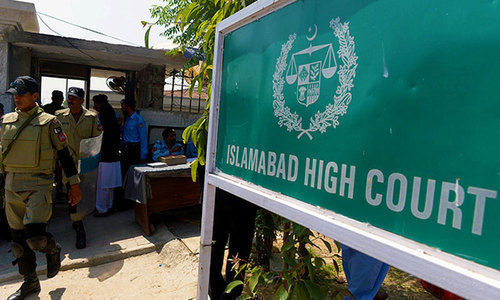Court recalls its earlier order of suspending licences of
21 lawyers for allegedly storming IHC CJ chamber
Zubair Qureshi
The Islamabad High Court has held that February 8, 2021 will always be remembered as Black Day in the judicial history of Pakistan.
A three-member bench of the IHC presided over by the Chief Justice Athar Minallah, the two others being Justice Aamer Farooq and Justice Miangul Hassan Aurangzeb observed in its order while restoring the licences of 21 lawyers who had allegedly stormed the chamber of the chief justice on Feb 8 this year, “February 8, 2021, shall always be remembered as a ‘Black Day” in the judicial history of Pakistan.
On the said date, a considerable number of lawyers left the vicinity of F-8 Katchery in the early working hours and stormed the High Court building at about 10:30 a.m.
“They pelted stones and hurled plants-pots at the Chief Justice Block and subsequently broke in and forced the Chief Justice and subsequently other Judges in the former’s chambers in state of being captive.
The captivity continued for almost the entire working day and ended after law enforcement agencies were called in.”
Subsequent to the event, the registrar of the IHC based on CCTV footages and other information received from eye-witnesses lodged complaints in the IHC naming a number of lawyers involved in the incident seeking approval for further action under sections 41 & 54 of the Legal Practitioners and Bar Councils Act 1973, said the court.
The court issued notices to all the lawyers involved seeking show cause and providing an opportunity of hearing to them before suspension of their licences.
Mohammad Shoaib Shaheen Advocate, appearing on behalf of some of the lawyers in the court, contended that no action was now required under section 54 of the Act inasmuch as 90 days period had lapsed and suspension period already expired. Hence, seeking further disciplinary action would be an exercise in futility.
The court also disposed of a complaint related to storming of the IHC and petitions filed by the suspended lawyers.
The court observed that like other professions, the legal fraternity also had a system of regulating the profession and for this purpose bar councils had been created.
The bench noted that bare reading of the two provisions of the Bar Council Act showed that while proceeding against an advocate on the ground of misconduct the bar councils may reprimand, suspend, remove from practice or make them pay compensation, fine or penalty if found guilty.
The court pointed out that in the past there had been incidents all over Pakistan of individual professional misconduct or otherwise acts of misconduct or a conduct unbecoming of an advocate.
However, the act or incident involving such a large number of advocates of the Supreme Court as well as High Court is unprecedented.
Hence, an appropriate action is required on part of the regulator against those who were responsible for it.
“Though we had suspended the licences under section 54 of the Act of a number of advocates/respondents who are facing the allegation of misconduct, we deem appropriate to recall the order for suspension of their licences,” the court order said, adding though the judges were not satisfied with the arguments that the instant proceedings had become infructuous as the period of 90 days had expired within which the complaints were to be sent to the bar councils as the same was not supported by law.










